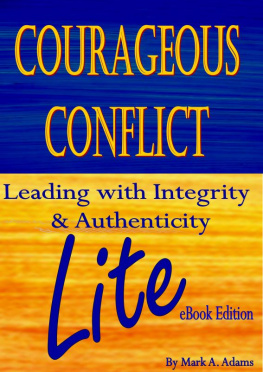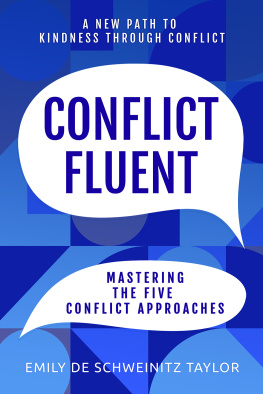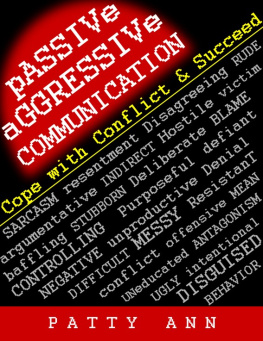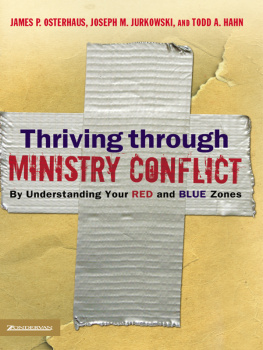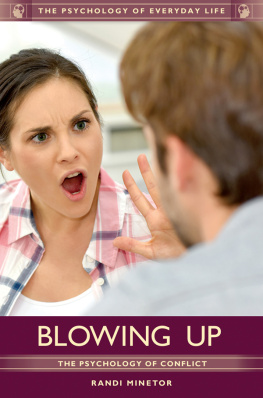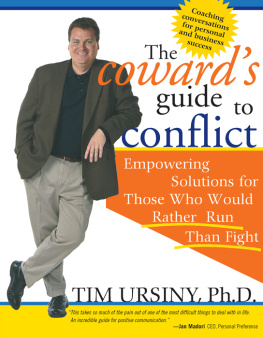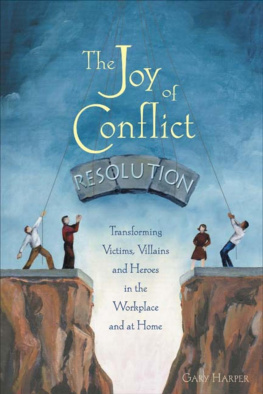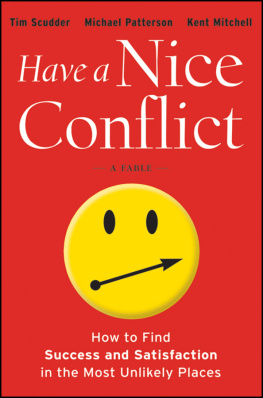Courageous Conflict-Lite
by
Mark A. Adams
This eBook will provide the readerwith concepts taken in from the book
Courageous Conflict: Leading with Integrity andAuthenticity
by Mark A. Adams.
Copyright 2013 Mark A.Adams
Smashwords Edition
Published by Achievement EdgePress
www.achievementedgetraining.com
Table of Contents
Introduction
We all experience conflict, some more often thanothers. How we respond to the people we are in conflict with notonly influences the outcome, it has the power to enhance or damagethe relationship. Unfortunately, conflict resolution is notsomething we are generally taught. We learn in part how to interactin a conflict from our role models and peers who may or may nothave the best approaches.
Conflict is present in our daily livesand how we respond to it determines our effectiveness, ourintegrity and our standing with others. Characteristically,conflict is viewed as bad due to the negative connotations,feelings and experiences we have had in the past. However, conflictcan also be a catalyst for good, when used to create better ideas,solutions, and resolutions to ongoing problems.
This shortened or liteeBook version of Courageous Conflict: Leading with Integrity andAuthenticity will provide thereader with a host of tools, concepts and ideas to help the readerlearn more effective ways to think about and work with conflict intheir daily lives.
A World without Conflict
Lets face it; aworld without conflict is not only unrealistic, it would beundesired. Without conflict, we would lose creativity andinnovation. Without conflict, we would be expected to conform andnot grow. For all of the negativity and fear of conflict, there arejust as many positive benefits. Learning to embrace conflict anduse it as a tool instead of avoiding it can make a world ofdifference. This book will talk about both interpersonal andintrapersonal conflict and how these elements influence and affectour lives and our relationships with others. At times, the materialmight challenge us to examine ourselves and how we approachothers.
Unfortunately, in society today thereis a fear of conflict, confrontation, accountability,responsibility and dealing with problems, whether our own orproblems with someone else. Despite the anxiety and fearsurrounding conflict, a great deal can be gained from it. Thetendency is to push it away, sweep it under the rug or otherwisedelay addressing it with the hope it will just go away on its ownor blow over if ignored long enough. It does not.
Most of the time not addressingconflict makes it far worse, especially when it cannot be ignoredor suppressed anymore. This is when conflicts can blow up; createwounds and fallout that leaves irreparable damage.
Attitudes & Perceptions aboutConflict
We each have our ownapproaches for how to deal with and respond to conflict in ourlives, everything from denial and avoidance to confrontation andmanipulation. At a time when the skills of responding to conflictare more critical than ever in our high-tech, fast-paced, pressurefilled world, we revert to old patterns and techniques that do notwork or create more damage than necessary.
Mention the word conflict or thephrase conflict management and almost immediately, others feelfear or anxiety. Why is this? We learn early on, conflict can bescary and is often bad. Some of the first lessons learned whenstarting school are about getting along with others. Later, as wegrow up, we are thrust into conflict without the skills orunderstanding of how to deal with it and end up seeing first-handhow conflict can be scary, because of its possible consequences. Wemight have gained some skills for dealing with conflict andexperienced both winning and losing by using skills, we haveseen modeled by parents and other role models. We get into such arush to deal with conflict, avoid it or put a bandage on it that wemiss the real benefit. Our failure to take advantage of the lessonsthat can be learned from our conflicts results in making the samemistakes repeatedly.
One of the first things we need toexplore is our attitude and approach toward conflict. The typicalconflict avoidant person seeks harmony and does not want to stirthings up. Other people who do not mind conflict might be leaving awake of destruction with rude, blunt and inconsiderate comments,not caring or realizing how their approach creates more conflictand lowers the amount of trust and respect people have forthem.
The attitude and belief that conflictis bad is one of the first things we need to overcome. Conflict isnot all bad. Conflict can help us look at things from differentvantage points and can help us become aware of things we might haveoverlooked or not known. Additionally, conflict challenges us andhelps push ourselves to grow, hopefully into a better, wiserperson.
Do we generally enter into conflictthinking about what we can learn from the other person/side?Unfortunately, we approach conflict with the mentality in which wefeel we know what is right and automatically consider the otherside wrong. We may push our own agenda and fail to realize we mightmake better decisions if we allowed ourselves to learn from theother side.
Understanding that some of us have moreto lose or gain from conflict can help us better understand why weare not as engaged or care about a particular conflict as much asothers. For example, a person who is in a position of authoritymight not have as much of an aversion to a conflict in which theyhave little or nothing to lose. At the same time, the other personmay have everything at stake in the same conflict so theirapproach, demeanor, emotions and even their investment in the sameconflict can vary greatly. This is not to say that all people inpositions of power view all conflicts this way, but it illustrateshow much we perceive what is on the line can influence ourinvestment in it.
Too often, we look at conflict aswin-lose or compromise. We respond without thinking clearly andwith emotional reactions. This brings fear and anxiety to theconflict, which blurs our ability to look for and understand whatis really going on. We become more focused on getting our pointacross instead of seeing anything other than our desired outcome.We become solidified in our position and subsequently cause othersto dig into their position, which only deepens the conflict.Exploring and striving to understand other positions does notnecessarily mean we have to change our mind. We need to be able tounderstand how we think. The better we understand our conflicts andourselves the better we can understand and relate toothers.
How we think aboutconflict
How we actually process a conflict isgreatly determined by our ability to understand and separate ouremotions from events and information. We need to be aware of whatwe think of the other person and our perception of theirintentions. We need to know why we have the position we do and howwe are being influenced to look at the conflict. We need to be ableto strip away all the unessential things that get in the way of ourthinking about the conflict, the people involved, our emotions andattachment to the outcome. By doing this we can begin to recognizethe clutter in our mind that is getting in the way of clearthinking. We need to allow ourselves to see outside of our frame ofreference despite how right we think we are. If we are convinced,we are not going to change our mind, we are wasting everyonestime, and likely going to stay stuck in the conflict. We have to bewilling to see outside of our position, not necessarily to changeit, but to let down our guard long enough to look around and reallyunderstand where the other side is coming from and why. We maythink we know, but in reality, we may only be partially correct. Ifwe are able to set our emotions aside temporarily, we can thenconcentrate on the conflict analytically, further allowing us tosee the issues and the situation for what it really is. We couldbenefit by spending more time thinking about our conflict beyondcomplaining, building cases, or worrying about it.
Next page
